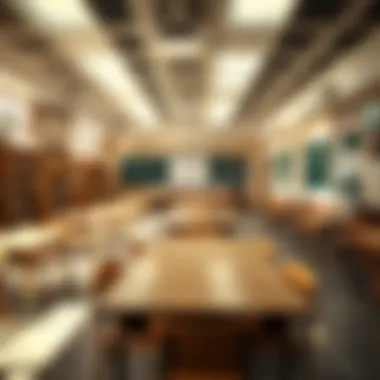Exploring Deira Private Schools and KHDA Ratings


Intro
Navigating the education landscape in Dubai, specifically in the vibrant area of Deira, reveals a complex web of choices for families. Private schools are increasingly becoming the go-to option for parents who seek high standards in education, and the Knowledge and Human Development Authority (KHDA) ratings are pivotal in this quest.
The KHDA plays a crucial role in assessing and rating schools across Dubai. With each annual inspection, they provide insights into schools based on various metrics, including the quality of teaching, student achievement, and leadership effectiveness. For families, understanding these ratings is not merely an academic exercise—it directly influences their decisions regarding where to enroll their children.
In this article, we delve deeper into the realm of Deira's private schools against the backdrop of KHDA ratings. This is more than just a numerical score; it’s about the educational choices that mold the future of students. As we explore these schools' performances, we'll also highlight the socio-economic dynamics that shape education in this rapidly developing urban center.
Understanding the KHDA Rating System
The landscape of private education in Dubai, particularly in Deira, is significantly influenced by the Knowledge and Human Development Authority, or KHDA. Understanding the KHDA rating system is crucial for parents, investors, and even educators. This system serves as a beacon of guidance, not just for choosing a school, but also for evaluating the overall educational quality within the region. It provides a framework that can discern between schools based on performance metrics, teaching quality, and student outcomes.
Overview of KHDA
KHDA was established in 2006 as a regulatory authority in Dubai. Its primary goal is to improve the educational landscape through quality assurance and enhancement. Every academic year, KHDA evaluates private schools across Dubai, including Deira. Schools are judged on various criteria to produce a rating system ranging from "Good" to "Outstanding."
A key point about KHDA is its approach—it's not just a top-down system. Schools often receive valuable feedback through the evaluations, enabling them to identify areas for improvement. This ongoing assessment helps elevate the entire education experience, ensuring that schools remain in tune with the needs of students and their families. In a city as diverse as Dubai, this responsiveness can make a world of a difference.
Rating Criteria Explained
Each school undergoes a rigorous assessment based on several criteria. These include:
- Educational Performance: How do students perform academically? Are they prepared for future educational challenges?
- Teaching Quality: Evaluates the effectiveness and methods employed by educators in nurturing their students.
- Curriculum Standards: Is the school’s curriculum aligned with international benchmarks?
- Student Welfare: Consider how well the school supports its pupils in terms of emotional and physical wellbeing.
Moreover, feedback directly from students and parents plays a role in shaping these evaluations. Schools are not just rated on their performance; the overall environment and community engagement are also critical factors—things like extracurricular activities, parent involvement, and facilities matter.
Importance of KHDA Ratings
KHDA ratings have profound implications for various stakeholders in the educational sector. For parents, these ratings serve as a guide in their school selection process. In fact, many families research and rely on these ratings when considering where to enroll their children. An esteemed rating often equates to higher demand, sometimes pushing schools to establish waiting lists.
"In the case of Deira private schools, KHDA ratings can determine not just enrollment numbers, but also a school’s reputation in the broader community."
For investors and agents, the KHDA ratings provide valuable insights into the sector’s health. Potential investors can analyze trends based on these ratings to make informed decisions about expanding into Dubai’s educational market. Additionally, the ratings can influence the pricing strategies of schools, impacting tuition fees and the overall financial landscape.
Overall, the KHDA rating system represents more than mere numbers; it encapsulates the ambition and effort to provide a quality education that meets the diverse needs of a rapidly evolving city. Understanding this system can help all parties involved navigate the complexities of educational choices in Deira.
Private Schools in Deira: An Preface
The landscape of private schools in Deira is not just shaped by their curriculum or facilities, but by the very fabric of the community they serve. As an area that embodies a melting pot of cultures, Deira's educational institutions must cater to a diverse student body, reflecting various nationalities, languages, and educational philosophies. With the influx of expatriates drawn by the thriving economy and vibrant lifestyle, private schools here play a pivotal role in shaping educational choices.
Importance of Private Schools in Deira
Private schools in Deira provide substantial benefits that go beyond academics. They often present:
- Tailored Curriculum: Many private institutions offer specialized subjects or curricula such as the British or American systems. This allows families to select an educational path that aligns with their cultural values and future aspirations.
- Diverse Extracurricular Activities: Holistic development is a focus for many schools. Students have access to a wide range of activities—sports, arts, and clubs—which enhance their personal growth and social skills.
- Community Engagement: These schools frequently organize community service initiatives, fostering a sense of belonging among students and their families, thus linking them to the broader Deira community.
Despite the advantages, parents considering private schools in Deira must weigh several factors, including tuition costs, school reputation, and KHDA ratings, which measure the quality of education. These ratings serve as a crucial guide, ensuring that families invest in the best educational environment for their children.
Demographics of Deira


Understanding Deira's demographics lays the groundwork for comprehending its educational demands. Home to a population that consists largely of expatriates, the area showcases a tapestry of cultural influences. As per recent statistics, the population is significantly skewed towards non-UAE nationals, including South Asians, Westerners, and Arabs.
- Population Composition: The diversity in nationalities affects the language of instruction and the cultural mindset within schools. Most institutions operate with a blend of English as the primary medium, while offering instruction in various native languages as needed.
- Age Group Distribution: With a considerable number of families with young children, the demand for primary education is robust. Families often prioritize quality schooling, moving to areas where reputable private schools are readily available.
This diverse demographic paints a picture of a community that values multilingualism and multicultural education, where schools not only impart knowledge but also prepare students to navigate an increasingly interconnected world.
Educational Landscape Overview
The educational landscape in Deira is a reflection of the socio-economic dynamics of the region. Private schools here offer a competitive array of programs designed to meet the higher expectations of parents and students alike.
In this bustling urban area, one can encounter:
- Variety of Educational Models: From international schools following the International Baccalaureate program to those offering a British or American curriculum, parents have a plethora of choices depending on their educational preferences for their children.
- Quality Enhancements driven by KHDA: The introduction of the KHDA rating system has prompted many schools to raise their standards. Continuous assessments and inspections work as motivators for schools to improve their teaching methods, facilities, and overall student services.
- Investment in Technology: Leveraging technology for learning has become paramount. Many schools have incorporated advanced tools into their classrooms, facilitating smoother communication and engagement in learning.
Overall, the educational landscape in Deira is multifaceted, with private schools playing an essential role in providing quality education. The balance between traditional values and modern needs creates an environment conducive to learning and personal development. As such, families looking for the best schooling options will find this landscape rich in opportunities and challenges.
KHDA Ratings of Deira Private Schools
Evaluating the performance of private schools in Deira is a vital aspect of understanding the local educational landscape. KHDA ratings are a significant reference point for parents, educators, and policymakers alike. They can guide families in making choices that align with their educational goals. Not only do these ratings reflect the quality of education a school offers, but they also indicate how well schools are meeting the diverse needs of students.
The importance of the KHDA ratings extends beyond mere numbers. These ratings represent a thorough evaluation process encompassing various criteria including academic performance, facilities, and student well-being. Parents looking for suitable schools often turn to these assessments, considering them a reliable resource to weigh the pros and cons of each institution.
Top Rated Schools
School A Profile
School A stands out due to its rigorous academic programs that emphasize both critical thinking and creativity. One of its key characteristics is an engaging curriculum that integrates technology in all subjects. This makes it a popular choice for families who prioritize innovative learning methods.
A unique feature of School A is its strong emphasis on extracurricular activities, which allow students to explore interests beyond academics. However, some might view the heavy workload as a potential disadvantage, as it can lead to stress among younger students. Nevertheless, the holistic approach has proven beneficial for its students' development overall.
School B Profile
School B is known for its inclusive environment that caters to a diverse student body. Its primary focus is fostering a sense of community while maintaining high academic standards. Parents often highlight the school's commitment to student well-being and mental health, making it a top choice among families.
One of its notable features is the dedicated support services it offers, like counseling and mentoring programs. These resources ensure that students are not only academically successful but also emotionally healthy. On the downside, some critics argue that the school may need to diversify its curriculum options further to meet varying student interests.
School Profile
School C is characterized by its international curriculum, which attracts expatriate families. The school's reputation for excellence in science and technology subjects is a major draw. Its labs and facilities are state-of-the-art, providing students with hands-on learning experiences that are increasingly important in today's job market.
What sets School C apart is its global networking opportunities, preparing students for future endeavors beyond the classroom. However, the tuition fees can be on the higher side, which might be a concern for some families. Yet, many argue that the investment pays off with the quality of education provided.
Emerging Schools with Potential
Emerging schools in Deira are gradually gaining recognition for their commitment to educational excellence. These institutions may not yet have top KHDA ratings, but they are making strides in various areas worth mentioning. First, a fresh approach to educational methodologies is being adopted, focusing on individualized learning plans catering to each student's unique needs.
Investors and parents might find these schools enticing as they often offer competitive fees compared to more established institutions, not compromising on the quality of education. Moreover, many of these schools emphasize cultural inclusivity and community engagement, adding another layer of appeal.
The trend toward innovation is noticeable, and it suggests a promising future for these emerging players in the educational sector. Parents might potentially find a hidden gem that resonates with their values and expectations.


Factors Influencing KHDA Ratings
The KHDA ratings play a vital role in shaping the educational choices of families in Deira. Understanding the factors that influence these ratings provides clarity on what to expect from private schools in the area. The interplay of various elements, such as curriculum quality, student-teacher ratios, and facilities, is crucial. Each factor not only affects a school's performance but also helps parents assess the potential for their child’s academic success and overall well-being.
Curriculum and Instruction Quality
When it comes to education, the old adage, "you can’t judge a book by its cover," rings true. But in the case of KHDA ratings, the cover, or rather, the curriculum, is incredibly telling. The quality of curriculum and instruction is a significant determinant of KHDA ratings. Schools in Deira are rated on how well they execute their curriculum, ensuring it meets educational standards and reflects international benchmarks.
The implementation of a consistent and well-structured curriculum fosters not just academic excellence but also critical thinking and problem-solving skills among students. Schools that invest in teacher training and instructional methods that engage students often find themselves rated higher.
In many instances, innovative teaching techniques, such as project-based learning or the integration of technology into lessons, enhance understanding and retention of knowledge. Parents looking for schools that encourage a hands-on approach may find that these attributes contribute significantly to a school’s KHDA score.
Student Teacher Ratio and Engagement
Another crucial factor that can’t be overlooked is the student-teacher ratio. The significance of having a manageable number of students per teacher cannot be overstated. High ratios can lead to less personalized attention, which in turn can diminish student engagement. When teachers have fewer students to manage, they can tailor their approaches based on individual learning styles and needs.
Moreover, student engagement plays an equally important role in determining ratings. Engaged students show improved academic performance and overall satisfaction with their schooling experience. Schools implementing interactive lessons, fostering open discussions, and encouraging extracurricular activities often see higher levels of student engagement. For parents, a school where teachers actively nurture a positive learning environment is likely worth considering, especially if it translates into better KHDA ratings.
Facility and Resource Adequacy
The infrastructure and resources available at a school are another pivotal aspect influencing KHDA ratings. Facilities need to be adequate to support various educational activities. A well-maintained, modern environment allows for both safety and an enjoyable learning experience. Schools with adequate laboratory spaces, libraries filled with resources, and technology-enhanced classrooms often score better in KHDA evaluations.
Access to extracurricular facilities such as sports courts, art studios, and music rooms can enrich a student’s educational experience. These resources not only contribute to students' academic success but also play a role in developing well-rounded individuals. When a school can demonstrate that its facilities enable comprehensive learning opportunities, it often earns a more favorable KHDA rating.
In summary, understanding these factors allows parents and potential investors to gain insight into what differentiates schools in Deira. As the competition to attract families keeps growing, schools that prioritize curriculum quality, maintain optimal student-teacher ratios, and ensure facility adequacy are more likely to achieve impressive KHDA ratings. This knowledge empowers parents to make informed choices about their children's education.
Impact of KHDA Ratings on Parents' Choices
In the bustling educational landscape of Dubai, private schools in Deira stand out for their varied offerings and performances, prominently reflected in their KHDA ratings. These ratings, which assess the quality of education provided by schools, play a pivotal role in shaping parents' choices regarding their children's enrollment. When families consider where to send their children for education, they're not only looking at academic performance but also at the holistic development that schools provide.
Decision-Making for School Enrollment
A parent’s journey to select a school can feel like navigating a maze, especially with numerous choices in Deira. The KHDA ratings serve as a solid compass during this journey. When parents see a high rating, it usually signifies a commitment to excellence, student welfare, and innovative teaching methods. For instance, if a school has received a "Good" rating or higher, parents may feel confident that their children will receive quality education. This assurance can reduce anxiety, helping families prioritize schools that align closely with their educational goals.
Many parents also rely on word of mouth; they might ask friends or relatives about their experiences in schools associated with certain ratings. Thus, schools with favorable KHDA scores can build a reputation, influencing the decisions of prospective students' families. All things considered, good ratings not only attract new applicants but can also enhance a school's status in the community.
Financial Implications
The financial aspect of choosing a school can’t be ignored. Education is often one of the largest costs families face. Schools that achieve higher KHDA ratings typically command higher tuition fees. However, many parents view these costs as an investment in their child's future. A school rated as "Outstanding" or "Very Good" might justify the higher fees through superior facilities, qualified teaching staff, and better extracurricular programs.
On the flip side, some parents might question whether the higher cost genuinely correlates with an enhanced educational experience. It raises the question of affordability versus quality. For families assessing their budget, the KHDA ratings become a critical factor in weighing the possible return on investment.
It’s interesting to note that some parents are willing to stretch their budgets or even explore scholarships in order to prioritize sending their children to a better-rated school. This illustrates a growing trend: the reliance on KHDA ratings not just for quality assessment but as a guideline for financial planning in education.
"Choosing a school is as much about trust as it is about ratings; parents want to feel secure that they're making the best choice for their child’s future."
Challenges Facing Private Schools in Deira
Private schools in Deira are navigating a unique set of challenges that significantly impact their operation and educational offerings. Understanding these challenges is crucial for stakeholders interested in making informed choices about education in this part of Dubai. The landscape of private education here is marked by competition, a diverse student base, and the accountability imposed by the KHDA ratings. By identifying these hurdles, investors, agents, and expatriates can better grasp how they shape the educational environment.


Resource Allocation
One of the foremost challenges that private schools in Deira face is resource allocation. Schools need to manage their budget meticulously to ensure they can provide quality education and facilities. This isn't merely about having enough money. It involves strategic decisions about where to allocate funds for teaching staff, infrastructural development, and curricular resources.
Some schools may excel in academic excellence but lack sufficient funds for extracurricular activities or modern teaching tools, which are essential for a holistic learning experience. Teachers need access to ongoing professional development, while students benefit from the latest technology in classrooms. Thus, striking a balance is essential, but it often feels like pouring water into a leaky bucket.
Key Considerations
- Staffing Quality: The hiring of qualified educators is paramount. Many schools compete for a limited pool of talented teachers.
- Facility Upkeep: Maintaining a conducive learning environment requires continuous investment, which becomes complicated with tight budgets.
- Extracurricular Enrichment: Programs that foster skills beyond academics are often the first cuts when funds are short. Schools need to prioritize these offerings to remain competitive.
Cultural and Linguistic Diversity
Another significant challenge is the cultural and linguistic diversity of Deira’s student population. With families from various countries, private schools must cater to a wide array of cultural backgrounds and languages. This diversity brings unique educational opportunities but also poses challenges in delivering an inclusive curriculum that meets the needs of all students.
In classrooms filled with children from different countries, teachers must find ways to integrate various cultural perspectives while promoting a sense of unity. This can mean everything from using multiple languages for instruction to ensuring that school events are inclusive of various traditions.
Implications
- Curriculum Development: Schools are tasked with creating a curriculum that reflects this diversity, which can strain resources.
- Communication Barriers: Language differences may hinder effective communication between teachers and students, requiring additional support and tools.
- Social Integration: Schools must also find ways to facilitate friendships among students from diverse backgrounds, which is vital for their social development.
Managing these challenges is critical for maintaining high KHDA ratings and ensuring that schools provide a quality educational experience. Both resource allocation and navigating cultural diversity will play a significant role in shaping the future of private education in Deira.
Future Trends in Education in Deira
As the UAE rapidly strides towards becoming a global education hub, Deira's private schools are at the forefront of this transformation. The trends we see emerging today reflect not just a response to current educational needs, but also an anticipation of future challenges and opportunities. Encompassing innovative learning methods and the integration of technology, these trends are essential not only for enhancing educational outcomes but also for preparing students for an increasingly complex world. By embracing these changes, schools in Deira can create an environment that nurtures creativity, critical thinking, and adaptability among students.
Innovative Learning Approaches
Innovative learning approaches are becoming the bread and butter of education in Deira. With diverse cultures and backgrounds, schools have started to tailor learning experiences to individual students rather than adopting a one-size-fits-all model. This can take many forms:
- Project-Based Learning: Instead of traditional lectures, students engage in meaningful projects that connect classroom theories to real-world issues. For instance, a project focused on sustainability might task students with developing a mini-garden, promoting teamwork and practical skills.
- Flipped Classrooms: This approach allows students to learn at their own pace outside the classroom and apply that knowledge during school. Teachers are becoming facilitators rather than just instructors, enabling a more hands-on learning experience in class.
- Collaborative Learning: Group activities encourage children to learn from each other, fostering both social skills and deeper understanding of the subject matter. When students brainstorm together, the result is often greater than the sum of its parts.
These methods not only engage students but also cultivate skills that are indispensable in today's job market. The ability to solve problems, think critically, and collaborate effectively is what many employers are looking for.
Technological Integration in Education
Technological integration in education has moved from being a mere addition to an essential component of the learning experience. In Deira, schools are harnessing cutting-edge tools to enhance teaching and learning:
- Digital Learning Platforms: Tools like Google Classroom or Microsoft Teams are becoming a staple, not just for remote learning but for managing assignments and facilitating communication between teachers and parents.
- Virtual Reality (VR) and Augmented Reality (AR): These technologies are starting to wade into the classroom too. Imagine a biology lesson where students can interact with 3D models of the human body or explore the surface of Mars right from their desks. This kind of immersive learning can significantly improve engagement and retention.
- Data-Driven Personalization: Schools are increasingly utilizing data analytics to tailor education to the individual student’s needs. By analyzing performance metrics, educators can identify areas where a student might be struggling and address them promptly.
"In the race of educational excellence, those who do not adapt to technology and innovative pedagogies may fall behind."
The End
Revisting the KHDA rating system and its implications, it becomes clear how profoundly such indicators influence the educational ecosystem in Deira. The KHDA's evaluations serve as a roadmap, guiding parents through the sometimes murky waters of private school options. By highlighting quality assurance in education, these ratings not only inform but empower parents to make choices that align with their children's needs and aspirations.
Summarizing KHDA’s Role
The KHDA plays a pivotal role in shaping educational standards across Dubai, focusing particularly on private institutions. Its methodology includes periodic assessments that cover various dimensions, from teaching quality to student welfare. This structured evaluation is essential. If you've ever pondered which school would truly benefit your child, understanding the nuances of KHDA's insights can be invaluable. Parents often rely on these ratings as a benchmark for school selection, ensuring that their investment in education translates into tangible benefits for their children. As the educational landscape continues to evolve, the KHDA remains a beacon of accountability for schools, compelling them to strive for excellence.
Final Thoughts on School Selection in Deira
Choosing a school for one's child in Deira is no walk in the park. The plethora of options, coupled with varying KHDA ratings, makes the decision complex. However, it's crucial to look beyond the surface ratings. Factors such as teaching methodology, cultural compatibility, and extracurricular offerings should weigh heavily in your decision-making process.
It's wise to reflect on your child's unique needs. As such, visiting schools, speaking with educators, and assessing the environment can be illuminating. Ultimately, the goal is finding a school that not only boasts favorable KHDA ratings but also aligns well with your family's values and objectives. The journey to finding the right educational match is as significant as the destination itself. For related details, you may find insights at KHDA's official site.
"Knowledge is power. Information is liberating. Education is the premise of progress, in every society, in every family." – Kofi Annan.











